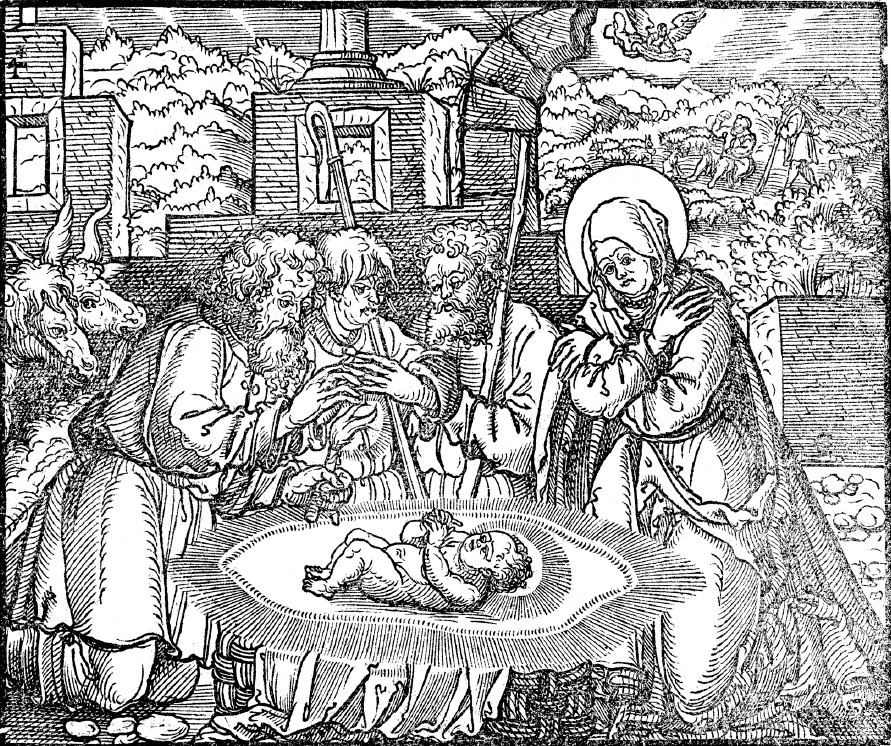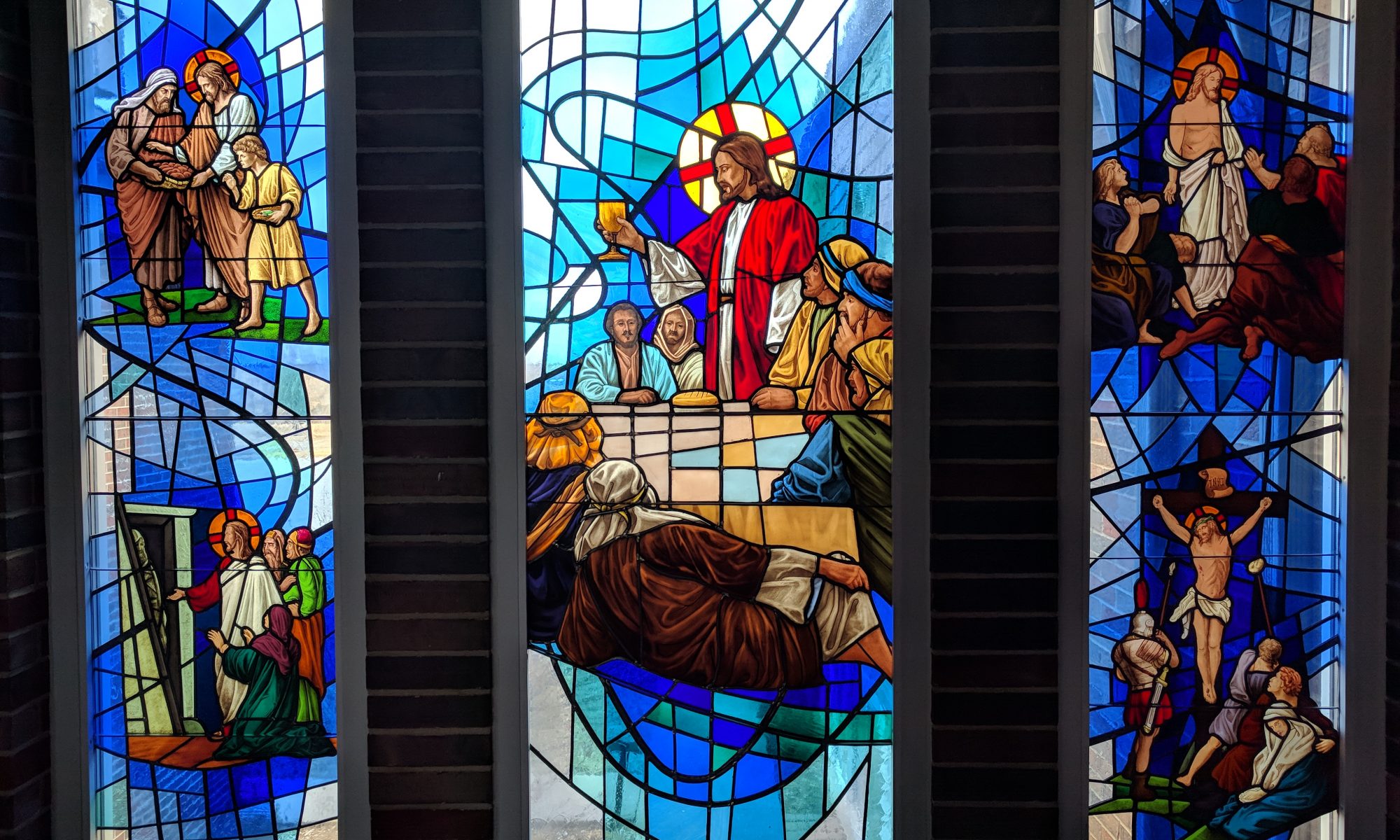
Lessons: Exodus 40:17-21, 34-38; Titus 3:4-7; John 1:1-18
Hymns: LSB 375, 383, 391, 381, 382, 370, 384, 380, 393, 358, 359
Grace, mercy, and peace to you from God our Father and our Lord and Savior, Jesus Christ. Amen.
You’ve probably heard the Andy Williams’ song many times that says, “It’s the most wonderful time of the year.” Not listed in the reasons for Christmas being the most wonderful time of the year is the birth of Jesus. Perhaps he means the nativity of our Lord when he sings, “And tales of the glories of the Christmases long, long ago.” But that is far from clear since there was only one Christmas long, long ago in which Jesus was born.
Anyway, if we look at the statement “It’s the most wonderful time of the year” from a Christian perspective (that is, wondering or marveling at the birth of Jesus), Andy Williams is certainly on to something.
While Christmas is one of the high points of the Church Year, it is not considered the highest. That honor belongs to the three days of Maundy Thursday, Good Friday, and Easter Sunday. There, Jesus instituted the Lord’s Supper, endured an awful trial, was beaten, crucified, and buried. He declared, “It is finished!” because He took away the sin of the world by means of His sacrificial death. Satan could not get Him to sin, and the grave could not contain our Lord; Jesus rose victoriously from the dead! Death is dead! Life lives! Jesus has earned for us forgiveness of sins and everlasting salvation! And so, that time of the Church Year is the most important time for the Christian. The triumphant joy and the powerful message of salvation found in our Easter hymns are unparalleled.
What, then, do we make of Christmas? Christmas hymns are indeed joyful. They’re more well-known than our Easter hymns. I can sing the first verse of many Christmas carols to shut-ins, and they usually know them by heart. And like Good Friday and Easter, Christmas, too, is incredibly important. You see, for something to be wonderful, it must elicit marvel and astonishment. This is exactly the case when we consider the birth of our Lord Jesus Christ.
When we confess the Nicene Creed, there is one spot where it is customary to bow. It is not when we confess that Jesus died or rose from the dead. Instead, it when we confess that Jesus “was incarnate by the Holy Spirit of the virgin Mary and was made man.” You may bow during those words because they confess a deep mystery that we simply cannot understand. How can God become a Man? How can God join His divine nature to human nature? How can the Creator become united to His own creation? And yet, that is exactly what takes place when Jesus comes into this world when He is conceived by the Holy Spirit and born of the virgin Mary, becoming man.
Our Gospel today heightens that mystery in the way in which our Lord’s birth is expressed. While St. Luke is beautifully written to tell us the account of our Lord’s nativity, God the Holy Spirit guided St. John to speak of our Lord’s incarnation in such a way that instills wonder and astonishment. “In the beginning was the Word, and Word was with God, and the Word was God… And the Word became flesh and dwelt among us” (John 1:1, 14). Jesus is the eternal logos (Word) who now tabernacles among us. He makes His dwelling here as our Immanuel. God who was present through the Old Testament tabernacle now becomes present in human flesh. Such a profound mystery!
Last night we listened to the birth of our Lord as recorded in Luke 2:1-20. Not a great emperor like Caesar Augustus or a king like Herod or the rich or the famous were informed that Jesus was born. Instead, it was the common shepherds who were keeping watch over their flock by night. Suddenly an angel of the Lord appeared to them and announced to them that the Savior is born in the City of David. They went with haste and found Mary and Joseph and the baby lying in a manger. And when they saw it, they made widely known what they had heard and seen concerning the child.
Do you remember what comes next? St. Luke announces, “And all who heard it wondered at what the shepherds told them” (Luke 2:18). They wondered! This usage of wonder doesn’t mean a type of questioning, like “I wonder how cold it will get this winter.” Instead, this usage of wonder is similar to marvel or astonishment at amazing things that have been done. Consider the question Moses posed after the Plagues and Passover were performed by God and the people of Israel crossed through the Red Sea on dry ground to safety. He asked, “Who is like you, O Lord, among the gods? Who is like you, majestic in holiness, awesome in glorious deeds, doing wonders?” (Exodus 15:11). We wonder at the wonders of God! Those who heard the shepherds wondered at the wonders of God. It was the most wonderful thing!
And so, my friends, pondering the incarnation and nativity of our Lord certainly brings about much wonder. From this perspective, we can say it is the most wonderful time of the year.
Yet, how much wondering do people do? Many by their actions suggest that Christmas Day is not for wondering about the mysteries concerning the birth of our Lord. Instead, they call it a family day. The kids wake up all excited about what Santa brought them. With their families, they open presents, eat food, sit around, perhaps open more presents, eat more food, play some games or watch something, and sit around some more. Little thought is given about Jesus and His birth. In fact, so many Christmas customs nowadays pull us away from pondering with wonder the events surrounding our Lord’s birth. It’s as if the Devil knows how to keep people so busy that they don’t take time to meditate upon the great mystery of our Lord’s incarnation and all the things that took place when Jesus came in the flesh some 2,000 years ago.
So what’s the remedy? It starts by hearing the Word, which is what you are doing. Your presence here shows that you have chosen to go against the modern trends and do what makes the most sense on Christmas Day—you go to Church. Since Jesus is the reason for the season and since this is the day the Church has chosen to observe His birth, it certainly follows that Christians will gather in His house on this day. And plus, as members of God’s family by Baptism, we can look around and recognize that we are all family. Here is our family!
Another way to ponder with wonder at our Lord’s birth is to read the Scriptures. A good practice is to read the birth of Jesus together when family gets together. And sing the wonderful Christmas carols that speak of our Lord’s birth.
Today’s service matches the regular liturgies of Church. But all the ordinaries (the sung parts of the liturgy that don’t change) are all replaced with Christmas hymns. These hymns were carefully chosen to match the words and themes found in the ordinaries. These Christmas hymns contain real substance. Of course, many songs associated with Christmas do not say much and some have nothing to do with the real Christmas. They’re songs about Santa or how cold it is out there or what we’re dreaming about. While those may be fun and may get our mindset into the reality that Christmas is upon us, they do not match the true Christmas hymns that speak of our Lord’s birth. Remember, the Gospel is the power of God. Hymns with this Gospel are also the power of God.
About half a year from Christmas, we observe Trinity Sunday. On that Sunday, we confess the Athanasian Creed. Perhaps we should also confess it on Christmas. Why? Because in it we confess, “Therefore, whoever desires to be saved must think thus about the Trinity. But it is also necessary for everlasting salvation that one faithfully believe the incarnation of our Lord Jesus Christ. Therefore, it is the right faith that we believe and confess that our Lord Jesus Christ, the Son of God, is at the same time both God and man. He is God, begotten from the substance of the Father before all ages; and His man, born from the substance of His mother in this age: perfect God and perfect man.”
Not only does this Creed rightly confess who Jesus is especially concerning His incarnation, but it also helps us wonder (or ponder) with astonishment our Lord’s incarnation.
St. John wrote of Jesus in today’s Christmas Gospel, “The true light, which enlightens everyone, was coming into the world. He was in the world, and the world was made through him, yet the world did not know him. He came to his own, and his own people did not receive him. But to all who did receive him, who believed in his name, he gave the right to become children of God, who were born, not of blood nor of the will of the flesh nor of the will of man, but of God” (John 1:9-13). It really is amazing how Jesus is the light of the world and He made all things—and yet He has joined Himself to His creation by way of His incarnation. He became a Man! Simply astounding! He did this despite our rebellion. He was not too ashamed of us. Instead, He for the joy that was set before Him entered our world to redeem it by way of the cross. By His grace, you are reconciled to God.
And so, my friends, as you go your way, remember what you have heard and seen this morning. Remember that you have tasted and seen that the Lord is good. Marvel, wonder, ponder these things. For through Christ, you have peace with God and your sins are forgiven. Indeed, it is a most wonderful time to be in God’s house to receive these blessings. Amen.
The peace of God which passes all understanding keep your hearts and minds in Christ Jesus to life everlasting. Amen

